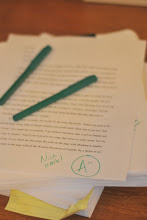A conversation with F. Scott today sent me into a bit of a tailspin. This and a string of conversations I've had over the last week, hearkened back to the thoughts I expressed a while back after my experience presenting at the American Educational Research Association conference.
I'm taking a great risk here that readers will assume I'm writing off educational research as a whole. I'm not. I'm an educational researcher working to get my doctoral dissertation published as a book for teachers, working to design a study to examine the pilot I'm running with my senior class next year, working to build a life as a K-12 teacher AND researcher. I'm not writing off educational research as a whole.
And yet, I'm frustrated.
I'm frustrated that given the sheer numbers of educational researchers out there, the current educational policy wave driven by people who are not educators is steamrolling any opposing idea. Shouldn't we have been out in front of that movement? Our involvement has been in the form of the well-known researchers who have been invited to D.C. to simply give a rubber stamp to the decisions the policy makers had already made (this was essentially the role I ended up playing on a state-level committee myself). With so many of us on the ground doing research, how on earth has our role as experts been usurped so completely?
I'm frustrated remembering how it felt in the first year of my doctoral program that my practical teaching knowledge wasn't particularly valued--not explicitly by the things people said directly about teachers but implicitly in the way teachers were positioned in the research we were asked to read and study. I'm frustrated by the conversations I had this past weekend with a former high school student of mine who has already had a career as a high school English teacher and who is now a doctoral student in an education program at one of the leading research universities in the country. She wouldn't dare tell people there that she might want to go back to K12 teaching once she finishes the program. But I say why not? Why shouldn't there be more educational researchers working out the context of K12 practice? Why isn't this a valued outcome of a education PhD program?
I'm frustrated by a conversation last week with a doc student currently in the program I graduated from. He is the editor of a state-level language arts journal that reaches hundreds of teachers in our state, and he has a hard time convincing his doc student colleagues and professors to submit to this journal. Maybe it's not a top tier research journal, but why not have your work read by TEACHERS? Sometimes it seems that we researchers write for each other, present for each other, work our butts off just to impress each other. Do teachers, administrators, and policy makers read the top tier research journals? Sometimes it feels like the goal becomes the most elegant research design, but I want to know how that affects the lives of the students in my 4th period class?
You know what I really want to do? I want to build a research cooperative located right here in the high school where I teach. I want to secure funding so that I can teach maybe 3 classes instead of 5 and have time dedicated to doing the research too. I want funding for some of the other teachers in my building too who are doing amazing things that they should be studying and writing about. I want to cultivate a voice, a presence, and find a way to speak to those who really matter when it comes to designing the contours of students' day to day existence in school. I want to find the best avenues for reaching these decision makers and cultivate a place for voices from the realm of practice to speak and have a seat at the table. Maybe we could even start a journal, something unlike anything that is out there.
But the question is how--how to accomplish this? Who would give us money? Would our school district support us?
Lots to think about.
--M. Shelley
The Charlie Kirk Murder Suspect
1 day ago

